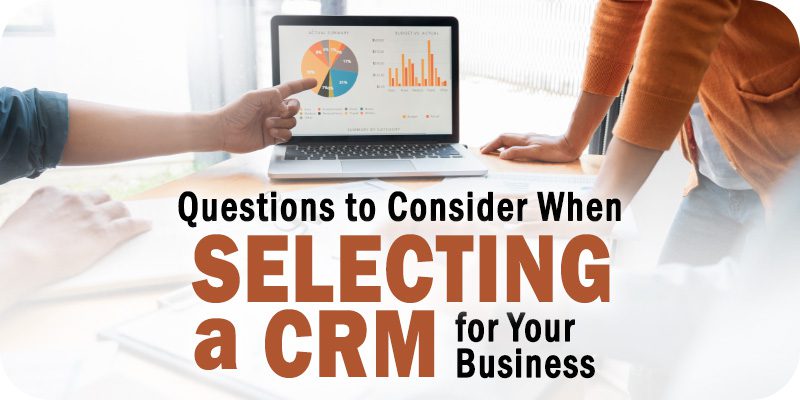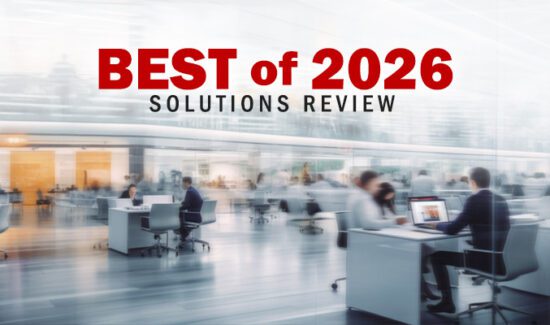Questions to Consider When Selecting a CRM for Your Business


The editors at Solutions Review have compiled a list of the most important questions to consider when selecting a CRM solution for your business.
The interactions between a company and its customers drive almost every decision that marketing and sales teams make. With Customer Relationship Management (CRM) software, these teams can streamline how they develop fruitful relationships with customers and ensure their audience has a positive experience with their brand while increasing productivity and streamlining processes across departments.
Analyst reports have described CRM as one of the largest software markets, which hasn’t changed. The market for these solutions has been growing steadily over the past decade, especially with new software constantly in various stages of development. However, selecting a CRM solution for your company can feel daunting with so many emerging trends to keep track of. There’s no one-size-fits-all approach to choosing a CRM, as different products will ultimately have other pros and cons.
For example, some solutions streamline the business process by providing sales and marketing automation, while others focus on data analysis and assist upper management and personnel. Another key feature of CRM is opportunity management, which focuses on qualified leads that can become tangible sources of revenue and help users nurture and analyze these revenue opportunities.
To help you get started, the editors at Solutions Review have compiled a list of questions to consider before and during the CRM consideration and selection process.
Questions to Consider When Selecting a CRM
1) What Business Needs Am I Looking to Address?
Every CRM solution has different strengths and weaknesses, so your team must take time to determine what functionalities are a priority. For example, an enterprise-level business might need a more advanced product with a comprehensive list of features. In contrast, a small-to-midsize business (SMB) may want a more straightforward solution focusing on a few key areas. Figuring out your team’s needs should be the first step to selecting a CRM solution.
2) What Are My Budgetary Constraints?
As expected, money is an essential consideration for CRM solutions, mainly since many platforms use different pricing models. Some CRM providers charge monthly, while others use a model that scales alongside the database’s number of users or contacts. Many solutions also offer a collection of add-ons, which can help you expand your software’s capabilities but increase the cost you pay. Before beginning your search for a CRM platform, ensure your company has a concrete budget to refer to once you get quotes from different vendors in the marketplace.
3) Can the CRM Scale Alongside My Organization?
Scalability, a solution’s ability to serve organizations of different sizes, is integral to selecting a CRM. Before purchasing a solution, consider how it can benefit your organization in the present (what needs do you need to meet right now?) and the future (how will those needs change when your company doubles in size?). Some vendors offer different purchase levels for organizations of various sizes, while others provide expansions you can purchase to expand the platform’s capabilities.
4) Will it Integrate With Your Company’s Existing Tech Stack?
A well-integrated CRM should be a central hub for a company’s sales and marketing technologies, connecting various business tools and systems. This integration enables smooth data flow across departments, eliminating data silos and providing a comprehensive view of customer interactions. In today’s interconnected business environment, the ability of a CRM to integrate with existing systems is not just a convenience—it’s a critical factor in leveraging technology to drive business growth and maintain a competitive edge.
5) How Will the Customer Data be Secured?
Alongside other roles, CRM software serves as a single, centralized location for all customer information a company possesses. Your chosen solution must offer secure data storage to protect your customer privacy. A CRM data breach could prove catastrophic for your company and its customers, so you should never close the deal on a solution until you know your information will be safe and secure.
6) Does it Offer Mobile Access and Functionality?
A CRM that offers flexible mobile access and functionality allows for real-time updates and responses, enabling staff to capture important information immediately after client meetings, respond promptly to customer inquiries, or make data-driven decisions on the go. Mobile CRM functionality often includes features like geolocation services for field sales, offline access capabilities, and streamlined interfaces optimized for smaller screens. This flexibility boosts productivity and efficiency and enhances customer satisfaction by enabling quicker response times and more personalized interactions.
7) Is the Software Easy to Use?
This is an easily overlooked question in the CRM selection process, but an important one. Once implemented, your company will use its CRM daily, so you must find a platform your team can quickly learn to use. If your company is smaller, it might benefit from a straightforward user interface. Meanwhile, a retail company will need a CRM tailored to the needs of their industry. Many CRM vendors even offer training and onboarding services to help their clients get to work as soon as possible.



















